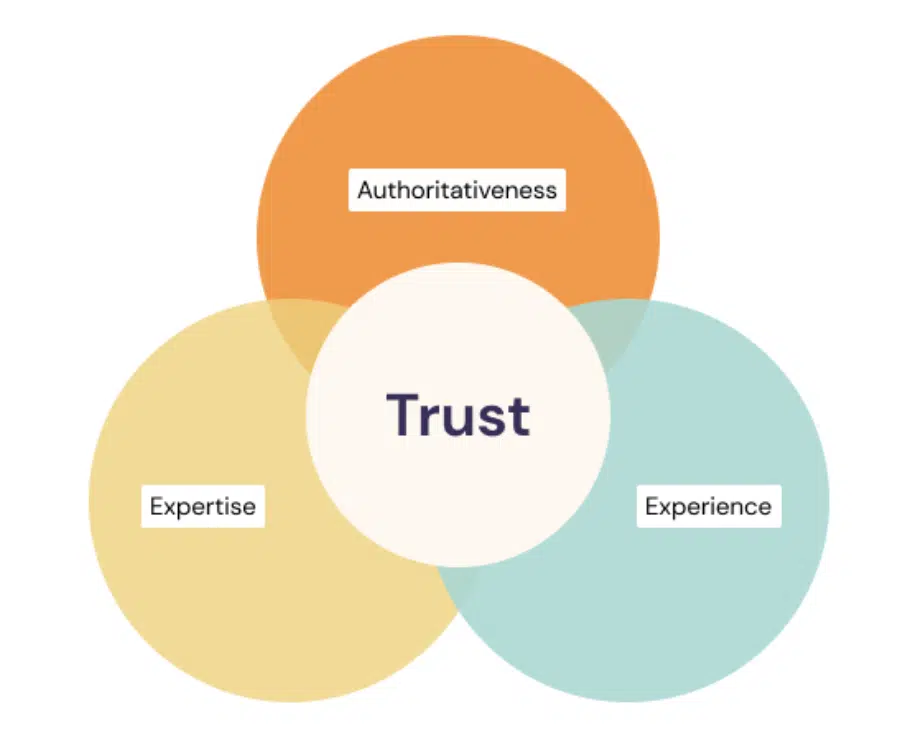In recent years, the SEO community has familiarised itself with the acronym E.A.T, which stands for Expertise, Authoritativeness, and Trustworthiness. These three factors have become cornerstones in evaluating the quality and reliability of online content, following Google’s emphasis on providing valuable and accurate information to users.
As we step into 2023, the SEO mantra has evolved to E.E.A.T, with an additional “E” representing Experience. This change underscores the growing importance of user experience in SEO practices and how websites interact with their audience.
What you should know about E.E.A.T:
- Expertise:
- It remains crucial for content creators to demonstrate a high level of knowledge and skill in their respective fields, ensuring the information provided is accurate and beneficial.
- Authoritativeness:
- Establishing authority in a particular niche or industry continues to be vital, and it’s achieved through consistent, high-quality content and recognition from peers and reputable sources.
- Trustworthiness:
- Building trust with the audience requires transparency, accurate information, and a secure website. It’s about creating a safe and reliable environment for users.
- Experience:
- The new addition to the acronym, Experience, places emphasis on the overall user experience. It’s not just about the content, but how users interact with the content and the website. Factors like page speed, mobile optimization, and interactive, user-friendly interfaces play a significant role in improving user satisfaction and, in turn, SEO rankings.
The transition to E.E.A.T demonstrates a holistic approach towards SEO, encompassing not just the quality and reliability of the content, but also the user’s interaction and experience with the website. This evolution is aligned with Google’s continual efforts to make the web a more user-friendly and trustworthy space.
Actionable Steps to Build E.E.A.T
Building E.E.A.T (Expertise, Authoritativeness, Trustworthiness, and Experience) into your website is an imperative step towards improving your SEO rankings and delivering a satisfying user experience. Below are actionable steps to help you align with the E.E.A.T framework:
- Demonstrate Expertise:
- Create High-Quality Content: Produce content that reflects a deep understanding of your topic or industry. Ensure it is well-researched, accurate, and provides value to your audience.
- Show Credentials: Where applicable, display the credentials of the content creators, especially in YMYL (Your Money Your Life) topics. This can include qualifications, certifications, or experience in the field.
- Establish Authoritativeness:
- Build Backlinks: Acquire backlinks from reputable sites within your industry. High-quality backlinks are a signal of authority to search engines.
- Share Expert Content: Guest post on reputable platforms and engage with other authoritative figures in your niche. Share your expertise and gain recognition within your community.
- Enhance Trustworthiness:
- Secure Your Website: Ensure your website has an SSL certificate to establish a secure connection. Display trust badges and have clear privacy policies and terms of service.
- Be Transparent: Provide clear contact information, and be open about who you are and what your business represents.
- Optimize User Experience:
- Mobile Optimization: Ensure your website is mobile-friendly. A significant amount of web traffic comes from mobile devices, and a mobile-optimized site is crucial for a good user experience.
- Improve Page Speed: Work on improving your website’s loading time as slow pages can frustrate users and negatively impact your SEO rankings.
- Interactive Content: Incorporate interactive elements like quizzes, calculators, or interactive infographics to engage users and enhance their experience.
- Collect and Analyze User Feedback:
- User Surveys: Conduct user surveys to gather feedback on the user experience. Utilise this feedback to make necessary improvements.
- Web Analytics: Use web analytics tools to track user behaviour and identify areas for improvement.
- Stay Updated and Adapt:
- Follow SEO Trends: Stay updated on the latest SEO trends and Google algorithm updates to ensure your E.E.A.T strategies are current and effective.
- Continuous Learning: Engage in continuous learning and training to enhance your expertise and stay ahead in your field.
By following these actionable steps, you can work towards building a solid E.E.A.T framework on your website, which in turn can significantly improve your SEO rankings and user satisfaction.
